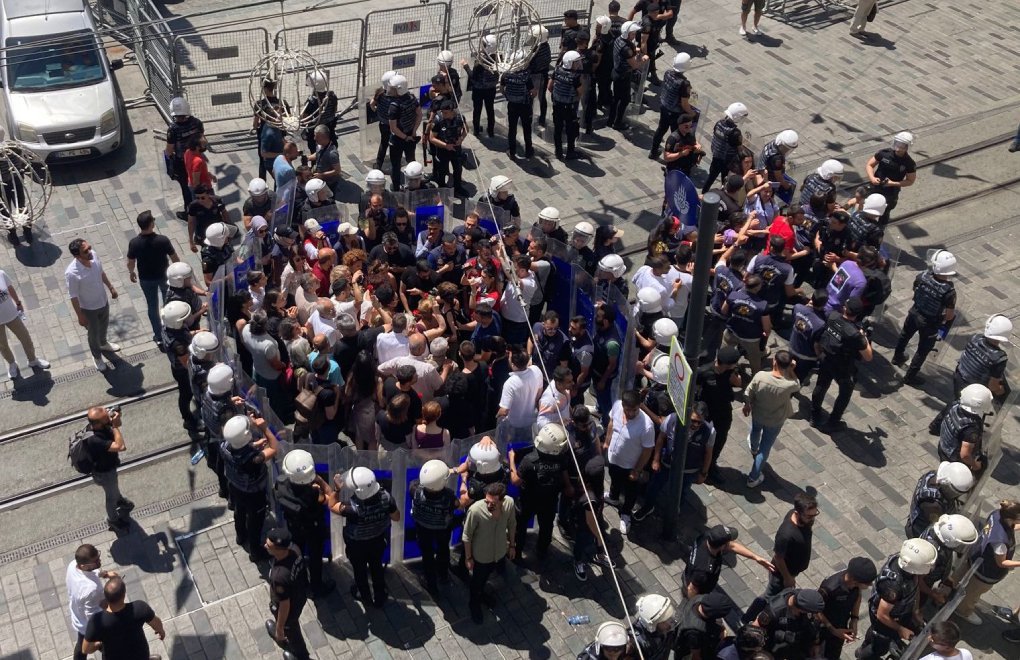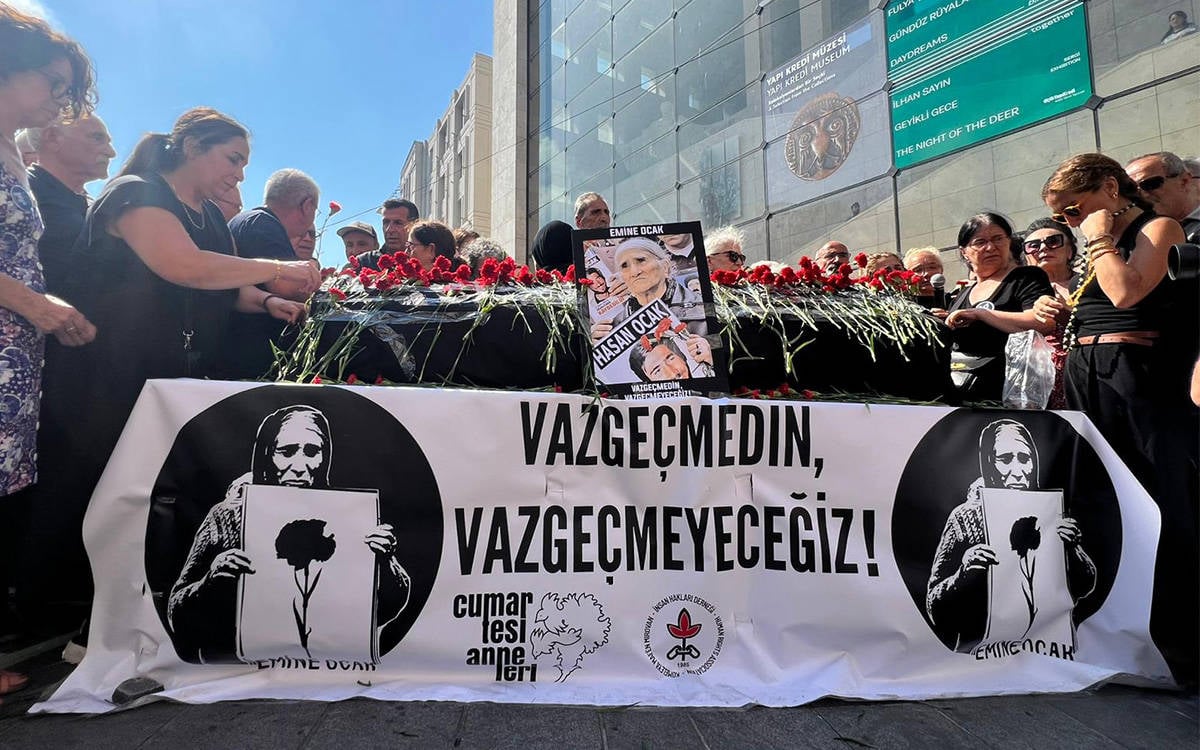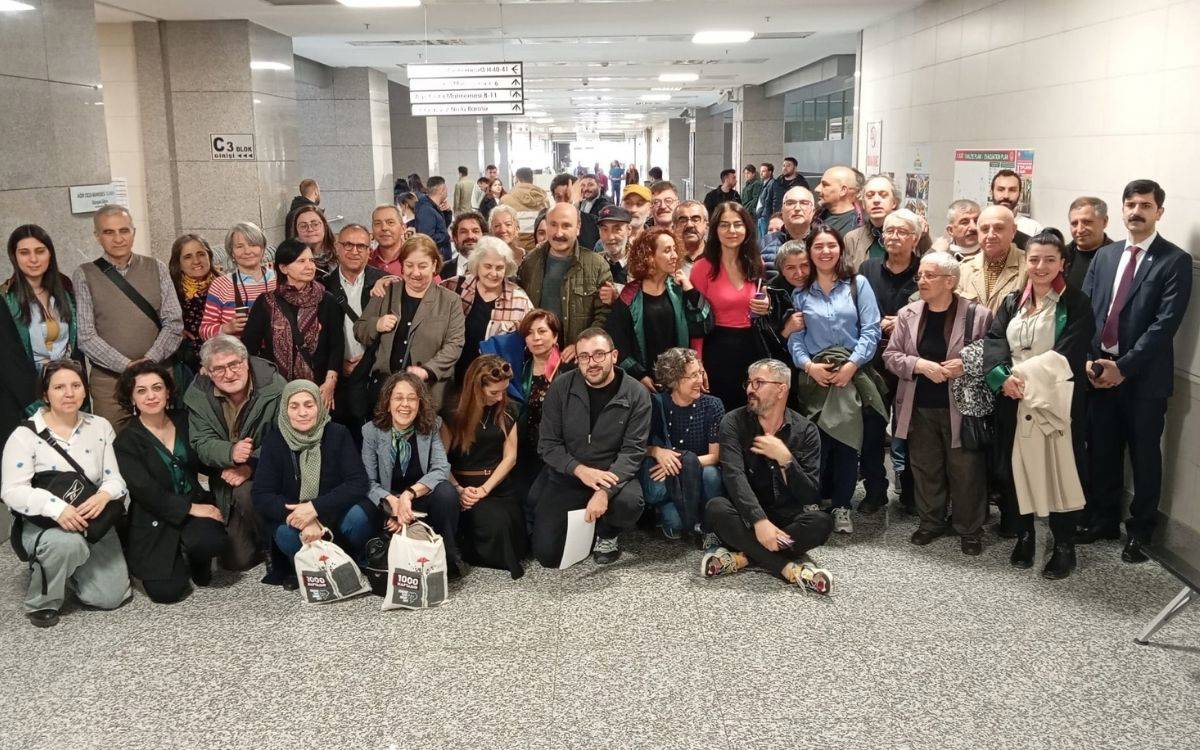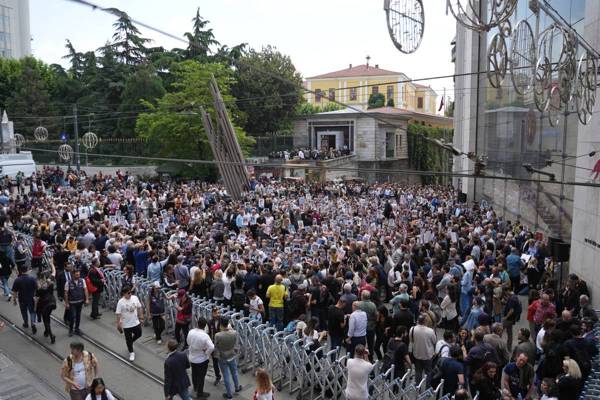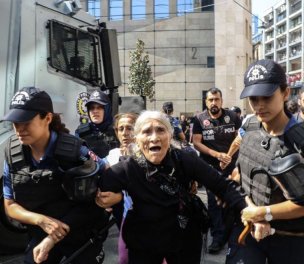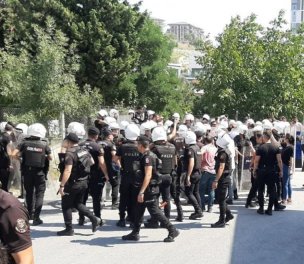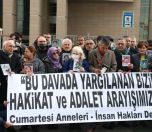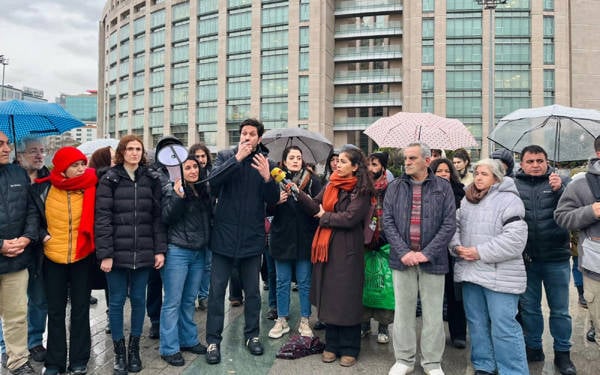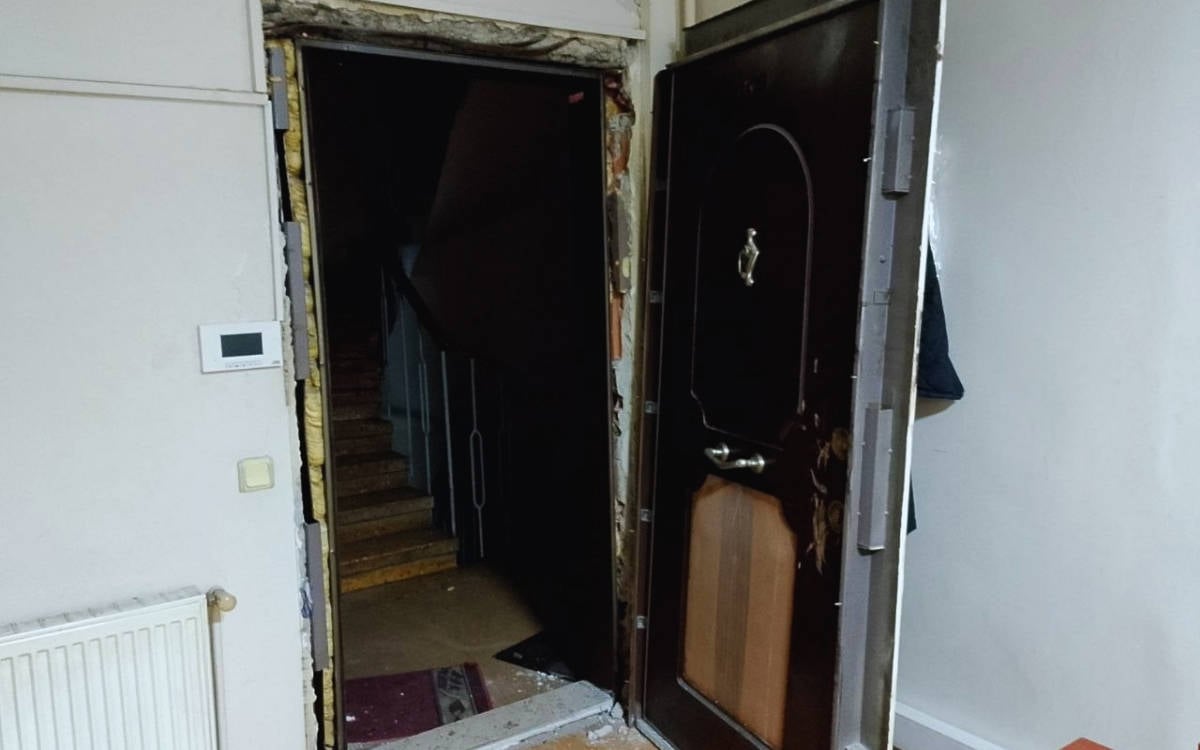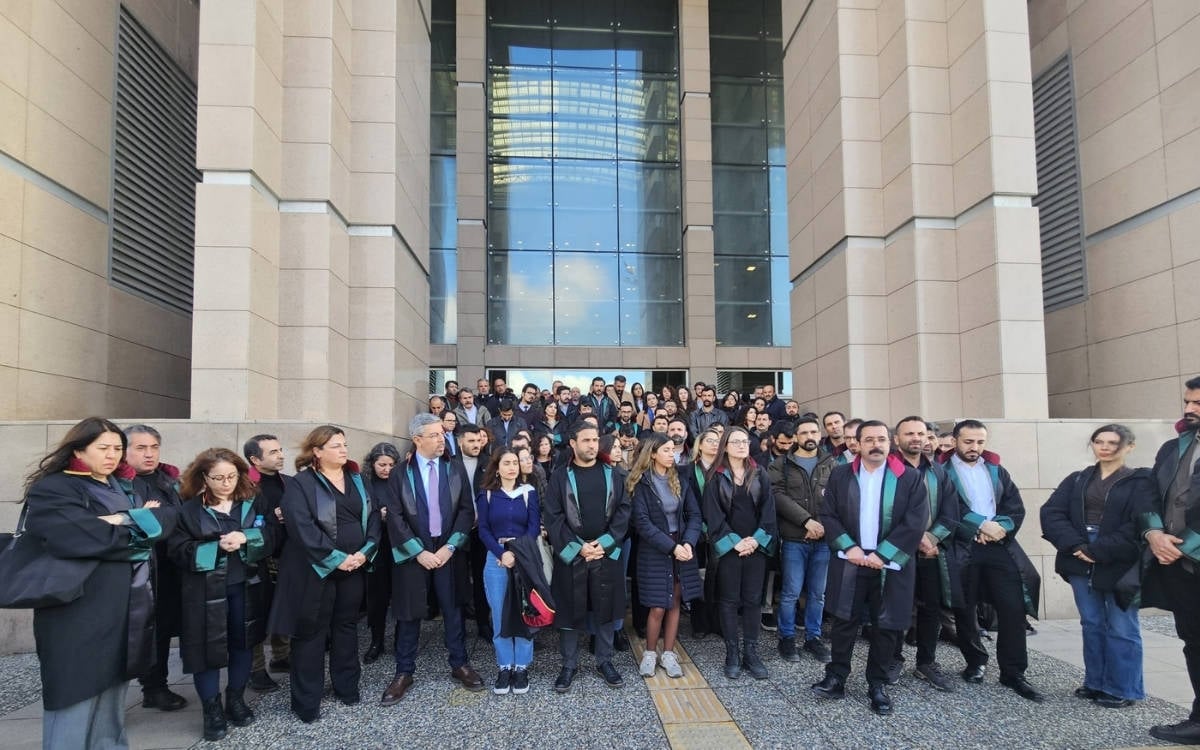Cüneyt Yılmaz, one of the founders of the Human Rights Association (İHD) LGBTI+ Commission, who gets detained every week, explained what happens inside the detention vehicles, which the press cannot observe (Auto-translated captions are available).
Click to read the article in Turkish
For decades, Saturday Mothers/People have been seeking justice for their loved ones forcibly disappeared during the Kurdish conflict in the 1990s, at Galatasaray Square on İstanbul's iconic İstiklal Avenue. Although their sit-in protests have been denied permission for the past five years, the group persists, enduring police violence and detentions every week. Those detained are loaded onto buses without heating during cold weather or ventilation during hot weather.
During this time, those who have shown more resilience than any participant in Saturday Mothers/People are a street dog named Zeytin (Olive) and a gray cat, usually found by where the riot police are located. Unlike some dogs that have emerged as symbols in various protests around the world, Zeytin is not yet the symbol of any social demand. According to those around, Zeytin has been living in Galatasaray for about four years. On days of protests, Zeytin sleeps, wakes up, and eats among the police stationed right across from Yapı Kredi Culture and Art Center. This is Zeytin's fate. İstiklal Avenue, and especially Galatasaray Square, is not a place where protesters, or even ordinary people passing by can freely exist.
Even feeding Zeytin every morning and evening and checking if it has any wounds, with the purpose of providing care, will probably be met with suspicion. Thus, sheltering Zeytin has become a part of the struggle for justice in Galatasaray Square. Because, in recent years, Beyoğlu has been turned into a precinct where access can be cut off at any time.
.jpg)
The siege
Galatasaray is a square under siege. The square is uneasy, as is Zeytin. It bit a police officer most recently on August 30, when private sector teachers who gathered on İstiklâl Avenue to demand wage improvements were detained. Not long before that, during the Saturday Mothers/People protest, she bit journalist Fatoş Erdoğan and two Green Left Party deputies. Zeytin's attacks undoubtedly stem from being overwhelmed in her living space every Saturday.
When the police begin advancing towards the protesters, Zeytin also starts moving, waking up from her deep sleep, and heading towards the barricade. It knows her belly will be filled, and there is no neglecting duty. It follows the protest until the detention vehicles depart. Not only the police and activists but also shopkeepers are accustomed to its presence. It's worth mentioning that for the past two weeks at Saturday Mothers/People's protests, K9 dogs have accompanied the demonstrators and surrounded human rights defenders during detentions.
The gray cat
.jpg)
Zeytin also has a companion: a gray cat. We know that it's difficult to confine cats. On the day of the filming, we found the gray cat in the same spot again: right next to the police station near Yapı Kredi Culture and Art Center. While the Republican People's Party (CHP) Beyoğlu District office broadcasts the song "Diren Anne" (Resist, Mother) every week to support the mothers, the cat observes the detentions. After the police vehicles leave the area, the cat returns to its territory. Perhaps it thinks that someone might rescue it from this life. Every week, tension, every week, frayed nerves.
Another defining aspect of Saturday Mothers/People's protest is the detention buses. On scorching summer days, most of the people, many of whom are above a certain age, are not intimidated by these buses, which even the police might not understand. Of course, it's difficult for them to understand farewells without graves, which they probably never experienced.
Forced disappearances
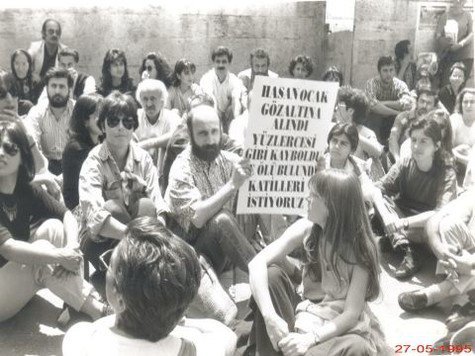
According to data from the Truth, Justice, and Memory Center, there were a total of 1,352 individuals recognized as forcibly disappeared in Turkey. A group of relatives of the disappeared and human rights advocates began sitting at Galatasaray Square on Saturday, May 27, 1995, at 12.00 p.m. Despite occasional police interventions, they continued the sit-ins uninterruptedly for 169 weeks. During the 170th week, which began on August 15, 1998, the security forces' prevented the protest and continued to do so for seven months. Every Saturday, for a total of 31 times, detentions occurred.
On March 13, 1999, due to the attacks by security forces, Saturday Mothers/People announced that they would temporarily suspend their sit-ins at Galatasaray. The Saturday sit-ins resumed on January 31, 2009, and faced police attacks again on the 700th week on August 25, 2018.
After 2018
With the general election on June 24, 2018, Turkey officially transitioned to the presidential system, which was approved in the referendum held in April 2017. Since that day, many opposition officials, legal experts, and those who passed the constitutional amendment referendum repeatedly stated that the transition to the presidential system would turn Turkey into a state governed by decrees and that the president would unlawfully govern the country with decrees.
During the 700th week of the sit-in on August 28, 2018, an iconic photograph captured the atmosphere. Opposition MPs and protesters formed a human chain against the police, resembling a Renaissance painting. That image was the share of Saturday Mothers/People in a Turkey now governed by a different system. During the 700th week, the police attacked them with rubber bullets.
The 700th week
Gülseren Yoleri, chair of the Human Rights Association (İHD) İstanbul Branch and a lawyer, stated that the 700th week event was "arbitrarily banned with the knowledge of the Minister of Interior Süleyman Soylu by a decision signed by the Beyoğlu District Governorate." The Human Rights Department of the Ministry of Justice claimed that the police intervention during the 700th week of Saturday Mothers/People's sit-in was "based on legitimate reasons, constituted a proportional intervention, and did not exceed the minimum threshold."
Forty-six people were detained on charges of "participating in meetings and demonstrations against the law despite warnings to disperse" and were prosecuted for violating the Law on Meetings and Demonstrations. Since the 700th week, sit-ins have been banned in İstanbul Beyoğlu District, allegedly on the grounds of "no prior notification." Maside Ocak, the sister of Hasan Ocak, who was forcibly disappeared in 1995 and whose case is among the most well-known cases of disappearance, was among those who were beaten and detained. Her 82-year-old mother, Emine Ocak, was also subjected to police violence.
Constitutional Court decisions
Maside Ocak filed a criminal complaint against the law enforcement officers and their superiors. However, the Chief Public Prosecutor's Office dismissed the claims and the Penal Judgeship of Peace rejected an appeal. Thus, Ocak brought the case to the Constitutional Court. In February, the high court ruled that the "right to organize meetings and demonstrations" regulated in Article 34 of the Constitution had been violated. The Constitutional Court awarded Ocak 13,500 Turkish liras in non-pecuniary damages. Subsequently, the court ruled that the police officers who attacked and physically abused Sebla Arcan during the Saturday Mothers/People's protest violated the prohibition of ill-treatment and torture. It ordered that the officers be tried and awarded Arcan 50,000 liras in non-pecuniary damages.
Despite these two Constitutional Court decisions, Saturday Mothers/People are still prevented from gathering. The protesters cannot exercise their constitutional rights, we cannot remove Zeytin and the gray cat from the police blockade, and we journalists continue to struggle to create an opening in the blockade every weekend, and we will continue to do so. (TY/VK)





